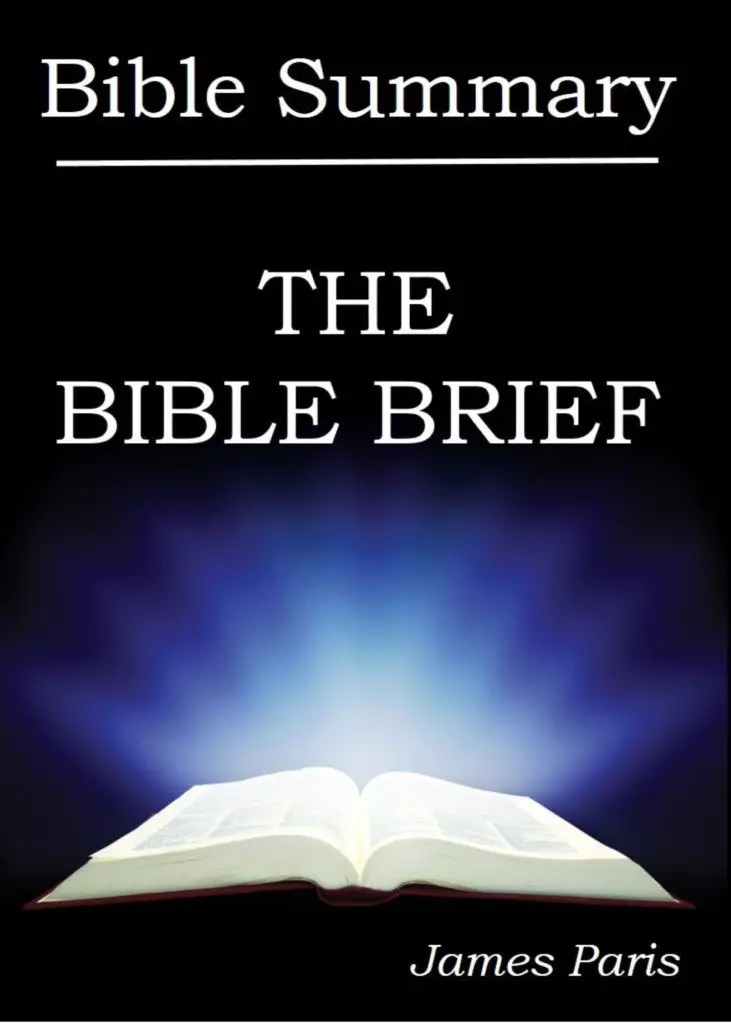A Concise Outline of the Bible
Why have a Bible Summary? It is a response to the argument that many have these days. Namely, the fact that for all our time-saving appliances, there seems to be even less time for ‘me time’. Even with the best intentions, sometimes it is just difficult to sit down to a full-blown Bible study.
Here is where books such as The Bible Brief plays their part. It lays out the main points within each book in a summary of around 500 words or so. This enables the reader to get a quick ‘flavour’ of the book. Allowing a more in-depth study of God’s Word when time or circumstance permits.
Bible summaries have certainly gained more attention in recent times. And the author James Paris seems to have his ‘finger on the pulse’ with this particular overview. Never intended as an in-depth theological work. This outline of the Bible has been written in an easy to grasp format. Covering some of the main issues involved.
Quick Overview Of The Old and New Testaments:
Old Testament at a glance:
- Genesis: Beginnings of the world and God’s covenant with Abraham.
- Exodus: Israel’s escape from Egypt and the Ten Commandments.
- Leviticus: Laws on worship, holiness, and moral conduct.
- Numbers: Census of Israelites in the wilderness and their journey.
- Deuteronomy: Moses’ farewell, laws, and reminders of God’s covenant.
- Joshua: Conquest of Canaan under Joshua’s leadership.
- Judges: Cycles of disobedience, oppression, and deliverance.
- Ruth: Story of loyalty and faithfulness.
- 1 Samuel: Samuel, Saul, and David’s rise to kingship.
- 2 Samuel: David’s reign, triumphs, and challenges.
- 1 Kings: Solomon’s reign and division of the kingdom.
- 2 Kings: History of divided kingdoms and exile.
- 1 Chronicles: Genealogies and David’s reign.
- 2 Chronicles: The history of Judah, focusing on kings and the temple.
- Ezra: Return from exile, rebuilding the temple.
- Nehemiah: Rebuilding Jerusalem’s walls and spiritual revival.
- Esther: Story of Esther’s bravery to save her people.
Wisdom Literature:
- Job: Testing of Job’s faith and God’s sovereignty.
- Psalms: Collection of poetic songs, prayers, and praises.
- Proverbs: Wisdom sayings for righteous living.
- Ecclesiastes: Reflections on life’s meaning and purpose.
- Song of Solomon: Love poetry celebrating marriage.
Major Prophets:
- Isaiah: Prophecies of the Messiah and God’s judgment.
- Jeremiah: Warnings of judgment and hope for restoration.
- Lamentations: Mourning for Jerusalem’s destruction.
- Ezekiel: Visions, prophecies, and symbolic acts.
- Daniel: Prophecies and stories of faith in exile.
Minor Prophets:
- Hosea: God’s faithful love despite Israel’s unfaithfulness.
- Joel: Prophecy of the Day of the Lord.
- Amos: Social justice and warnings of judgment.
- Obadiah: Judgment on Edom for mistreating Israel.
- Jonah: Prophet’s journey and God’s mercy on Nineveh.
- Micah: Calls for justice and hope for the future.
- Nahum: Judgment on Nineveh.
- Habakkuk: Questions, complaints, and trust in God’s sovereignty.
- Zephaniah: Judgment and restoration.
- Haggai: Urges rebuilding the temple.
- Zechariah: Visions of restoration and future glory.
- Malachi: Calls for repentance and promises of a coming messenger.
New Testament at a glance:
- Matthew: Jesus as the Messiah, teachings, and miracles.
- Mark: Jesus’ ministry, miracles, and sacrifice.
- Luke: Gospel of compassion, parables, and miracles.
- John: Jesus’ divinity, love, and eternal life.
- Acts: Early Christian history and the spread of the gospel.
- Romans: Justification by faith, righteousness, and grace.
- 1 Corinthians: Paul’s teachings on church issues.
- 2 Corinthians: Paul’s defense of his apostleship.
- Galatians: Freedom in Christ and justification by faith.
- Ephesians: Spiritual blessings, unity, and Christian living.
- Philippians: Joy in Christ and living for others.
- Colossians: Christ’s supremacy and instructions for holy living.
- 1 Thessalonians: Encouragement and teachings on the Second Coming.
- 2 Thessalonians: Further teachings on the Second Coming.
- 1 Timothy: Instructions for church leadership.
- 2 Timothy: Paul’s farewell and encouragement to Timothy.
- Titus: Instructions for appointing church leaders.
- Philemon: Paul’s appeal for Onesimus.
- Hebrews: Superiority of Christ and faith in action.
- James: Practical Christian living and faith’s works.
- 1 Peter: Suffering and hope in Christ.
- 2 Peter: Warnings against false teachers.
- 1 John: Love, fellowship, and assurance of salvation.
- 2 John: Warnings against false teachers.
- 3 John: Commendation for hospitality.
- Jude: Warning against false teachings.
- Revelation: Vision of the end times, Christ’s victory, and a new heaven and earth.
Bible Brief – Bible Summary Book
It has to be said that to attempt an in-depth overview of books such as Deuteronomy or Joshua or Jeremiah. et al, in 500 words would be an exercise in futility!
That said, this is an honest attempt to bring a ‘quick flavour’ of the main issues involved. Whilst leaving limitless scope for more indepth studies into the characters . And the messages contained within the pages of the Bible.
The format of every Book or indeed Epistle, in both the Old and New Testaments, is laid out as follows:
- When: The date of the book was written or the time period covered.
- Who: The author or presumed author of the book.
- People & Places: The ‘main players’ & places involved or referred to.
- Sound-bites: Memorable quotes, sayings or verses from the book.
- The Messianic Link: The coming Messiah is mentioned throughout – and ties together – the 66 books. These are just some of the scriptures that allude to or name the Messiah directly.
- The Book: An outline of the book or letter.
- Notes & Quotes: General thoughts & comments on the preceding book.
Why A Bible Summary?
The fact is that as you probably know, the Bible is a big book! yes indeed. With over 600,000 words spread between 66 books and documents/letters. This is no light-weight in the world of publishing.
Every aspect of human nature is explored and revealed in this book – warts and all. Even the ‘saints’ are exposed when they ‘step over the line’. Everything from miracles to murder to incest, to adultery and skulduggery. Extreme bravery and cowardice, is revealed and dealt with. No stone is left unturned and no evil (or good) deed not exposed to the light of The Lords Holiness and justice.
This Bible summary book aims to highlight parts of each book or letter (as in the list above). In such a fashion that creates a concise overview of the wisdom contained within the whole.
Many people believe that the Bible is a collection of wise sayings and stories, a guidebook. To be read and put on the shelf or simply to be kept as a reference manual. All this is true. The Bible is full of wise sayings, and it makes an excellent reference manual. But to use it in this limited way is to miss the complete story.
In a nutshell the Bible is ‘Gods plan for man’. It describes how God has dealt with the human race in the past – and how he continues to do so now and in the future.
The Bible In A Nutshell
The Holy Bible is a collection of books and letters split into Old and New Testaments or Covenants. Written by human hand with divine inspiration, between 1200 BC and 100 AD. It begins with Genesis in the Old Testament, and finishes with the book of Revelations in the New.
Material on this site extracted from The Bible Brief and other works including The 12 Minor Prophets by James Paris, is re-used with the express permission of the author and in accordance with copyright law.
Gospel Of Matthew Summary | Gospel Of Mark Summary | Gospel Of Luke Summary | Gospel Of John Summary
THE BIBLE SUMMARY BOOK


